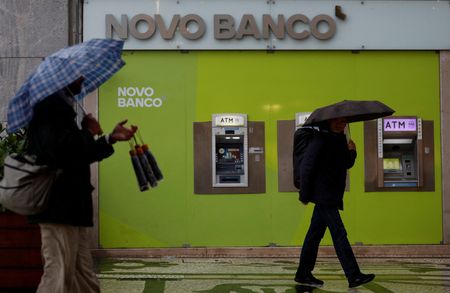LISBON (Reuters) – The three owners of Portugal’s fourth-largest bank Novo Banco have agreed to lift a ban on dividend payouts, paving the way for its potential sale or an initial public offering in 2025, the finance minister was quoted as saying on Friday.
Joaquim Miranda Sarmento told the Expresso newspaper the agreement, involving the state and Portugal’s banking resolution fund, and the majority owner U.S. private equity fund Lone Star, “is an important milestone for the Portuguese financial system”.
Novo Banco was created in 2014 from the remains of collapsed lender BES after a multi-billion-euro government bailout. Lone Star acquired a 75% stake in 2017. The Portuguese resolution fund and the state own the remaining 25% stake.
The bank has been banned from paying out dividends until December 2025, leading to it becoming overcapitalised with a core Tier-1 fully loaded capital ratio of 20.7%, more than double the minimum requirement of 9.3%.
Unblocking dividends is a necessary condition for any stake in the bank to be offered, be it in an IPO or direct sale. Novo Banco CEO Mark Bourke has said the bank would be ready to launch an IPO early next year.
Three sources with knowledge of the matter told Reuters in September that Lone Star is considering a sale as well as an initial public offering.
The dividends deal should allow Lone Star to pocket around 900 million euros $956 million) in dividends in 2025, while the fund and the state would get a total of around 300 million, Expresso said.
The top five Portuguese banks, which also include state-owned Caixa Geral de Depositos, Millennium bcp and Caixabank’s Banco BPI, control more than 80% of the nation’s banking assets, but analysts see room for further consolidation as a means to improve competitiveness.
The Portuguese arm of Spanish banking giant Santander would consider a potential acquisition of rival Novo Banco, depending on price, Santander Totta’s CEO said last week.
($1 = 0.9416 euros)
(Reporting by Sergio Goncalves; Editing by Andrei Khalip and David Evans)

